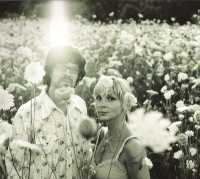Over the Rhine had already developed a large and intensely loyal following in its native Cincinnati, OH, before they independently released their first two albums, Till We Have Faces (1991) and Patience (1992). Their music, which they aptly dubbed "post-nuclear, pseudo-alternative, folk-tinged art-pop," is difficult to pigeonhole. They have been compared to 10,000 Maniacs, the Innocence Mission, U2, and Shawn Colvin, but the band's personality seems to owe more to their literary influences (which include Dylan Thomas, C.S. Lewis, and T.S. Eliot). They drew attention to their independent albums with their attractively arty CD packaging, and when IRS signed them in 1992, Patience became the first album in the label's history to be re-released with its original indie cover art. But 1994's Eve would end up the only album the band would record on an IRS budget (with the exception of a slightly touched-up re-release of Till We Have Faces in 1995). When the label was bought out in 1996, Over the Rhine escaped from its five-record contract, fearing a loss of artistic autonomy. By the end of the year the band had released two imaginatively sparse acoustic CDs on its own: Good Dog Bad Dog and The Darkest Night of the Year, a melancholy Christmas album. 1996 also saw significant personal changes for all four bandmembers: Over the Rhine's chief songwriters (bassist/pianist Linford Detweiler and classically trained lead singer Karin Bergquist) were married in October. In December, guitarist Ric Hordinski left to devote more time to his own band, Monk, and drummer Brian Kelley followed (before he changed his mind in 1997). The group issued Besides, a fan-club-only compilation of rarities, in early 1997; the official album Amateur Shortwave Radio appeared in 1999. The band's sixth studio effort Films for Radio appeared in early 2001. Two years later, Detweiler and Bergquist returned with Ohio. This double-disc set, which marked Over the Rhine's tenth album overall, reflected the band's Midwestern connections. Following a tumultuous year of heavy touring, the band returned to the studio (Bergquist and Detweiler's living room, to be precise) and recorded their next album, Drunkard's Prayer, which came out in 2005. They released a career retrospective, Discount Fireworks, two years later. ~ Darryl Cater, All Music Guide
Source: http://new.music.yahoo.com/over-the-rhine/biography/
